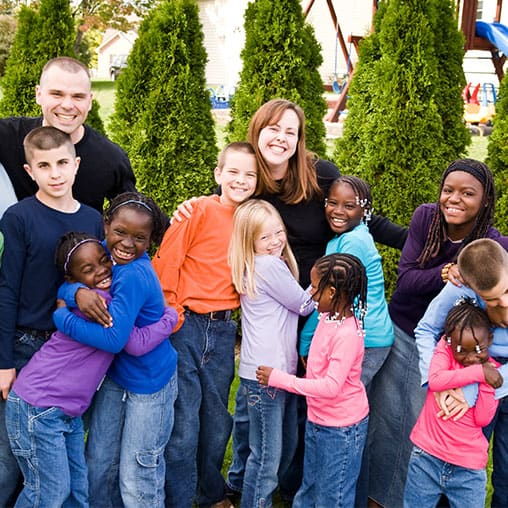
Lessons We’ve Learned as Parents
Are you called to adopt?
10 Ideas: Ministering to Orphans
Show Notes
About the Host
About the Guest
-
Are you called to adopt?
10 Ideas: Ministering to Orphans -
Dave and Ann Wilson
Dave and Ann Wilson are hosts of FamilyLife Today®, FamilyLife’s nationally-syndicated radio program. Dave and Ann have been married for more than 38 years and have spent the last 33 teaching and mentoring couples and parents across the country. They have been featured speakers at FamilyLife’s Weekend to Remember® marriage getaway since 1993 and have also hosted their own marriage conferences across the country. Cofounders of Kensington Church—a national, multicampus church that hosts more than 14,000 visitors every weekend—the Wilsons are the creative force behind DVD teaching series Rock Your Marriage and The Survival Guide To Parenting, as well as authors of the recently released book Vertical Marriage (Zondervan, 2019). Dave is a graduate of the International School of Theology, where he received a Master of Divinity degree. A Ball State University Hall of Fame quarterback, Dave served the Detroit Lions as chaplain for 33 years. Ann attended the University of Kentucky. She has been active alongside Dave in ministry as a speaker, writer, small-group leader, and mentor to countless wives of professional athletes. The Wilsons live in the Detroit area. They have three grown sons, CJ, Austin, and Cody, three daughters-in-law, and a growing number of grandchildren.
-

Michael and Sharon Dennehy
Mike and Sharon Dennehy were living the American dream. They were in love, had three children and a steady income. All it took was one black-and-white photo to change their lives. The caption read, “Boy with no arms in Romania desperately needs a loving home.” Mike and Sharon glanced at each other and they made arrangements to travel to Eastern Europe to the home of their soon-to-be adopted son, George. Adoption wasn’t always the plan for the Dennehy family. Back in college, Sharon was...more
Some of the greatest lessons of life come through parenting. Michael and Sharon Dennehy, the parents of 12 children, nine of whom are adopted, have spent much time in life’s classroom and reflect on what adoption has taught them.
Lessons We’ve Learned as Parents
Bob: If you’re thinking about adopting a child from another country, and you share your thoughts with family and friends, Mike Dennehy says, “Be ready for some opposition.”
Michael: The natural reaction, especially in the US, is—if a child is say two years old, somewhere in a country, poor/starving—your relatives will surround you, well-intentioned, and your friends—they’ll say, “Well, what are you going to do about college?” They’ll start throwing out problems for you that are years away and not necessary. The child is—somewhere, malnourished, dying, with no family—and they want you to sweat whether they are going to go to Harvard or not.
When those kinds of things creep in, Sharon will just go: “Well, what if it were you? Would you want to come to America and be a part of a family or would you want to stay over in a gutter because someone decided they couldn’t put in bunk beds?”
Bob: This is FamilyLife Today for Wednesday, December 19th. Our host is Dennis Rainey; I'm Bob Lepine.
1:00
How do you make the decision, as a family, whether adoption is right for you? That’s one of the questions we’re going to talk about today. Stay with us.
And welcome to FamilyLife Today. Thanks for joining us on the Wednesday edition. I think what we’re going to talk about today will help all of us put the Christmas season in the right perspective.
Dennis: It will. We need to be reminded sometimes through, perhaps, what might be considered by some an extreme example. Like the letter I received, a number of years ago, from a radio listener—from a lady who found a way—I don’t know how she did it, but she found a way to listen to FamilyLife Today. She was a mom. I don’t know all of the details about her family, but she was homeless.
2:00
She wrote to talk about how she so appreciated the broadcast and she wanted to be a donor/a stakeholder in FamilyLife Today. Opening the letter, a dollar bill fell out—one dollar. I kept that dollar on my desk for a number of months just to remind me of the sacrifice that that must have represented from that woman and the help/the hope she was finding in the Scriptures.
I don’t know, again, what her circumstances were; but Bob, we’re touching families in all kinds of issues: We’ve got blended families; we’ve got intact families; we’ve got folks, who have been divorced, who are looking for healing; we’ve got single-parent moms and dads, who need someone to come alongside them and make this broadcast possible—because they simply may not be able to stretch their budget enough to make this broadcast possible.
3:00
Bob: That woman, who sent a dollar—at one level, she wanted to say, “Thank you for how you’ve helped me,” and another level, she was saying, “I want to help other people”—
Dennis: Exactly.
Bob: —because when you invest in this ministry, that’s what you’re doing. You’re making FamilyLife Today possible for tens of thousands of people/hundreds of thousands of people, who are tuned in every day to find help and hope.
Dennis: And I just want to say, “Thanks,” to those of you who are Legacy Partners, who give monthly. Thank you for consistently standing with us through your monthly donations.
I’d just like to ask a listener right now: “If you’ve never given, could you give? Could you join with us? We really need your help right now. We’re running a bit behind where we need to be, for here, in December. It’ll impact how far we’re able to go in reaching families all across our country.”
Bob: We have a matching gift right now; and every time a listener, like you, makes a donation, your donation is going to be matched, dollar for dollar.
4:00
In fact, the total amount of money available in that matching fund has just increased. It’s up to $3 million right now, which is a huge amount. Here, at FamilyLife®, we’re hoping to take full advantage of that matching gift.
That’s why we’re asking you: “If you’re a regular listener—if FamilyLife Today has been meaningful for you—would you go online, right now, and make a yearend donation, knowing that your donation is going to be matched, dollar for dollar? When you make a donation, you can request the DVD of the movie FamilyLife produced this year called Like Arrows. It’s not available for sale yet, but we do have copies available for those of you who can make a yearend donation. Go to FamilyLifeToday.com—make an online donation—you’ll get the DVD and your donation will be matched, dollar for dollar. Or call to donate: 1-800-FL-TODAY is our number—1-800-358-6329—that’s 1-800-‘F’ as in family, ‘L’ as in life, and then the word, ‘TODAY.’”
5:00
We’re talking about adoption this week. I’m just curious: “Would you and Barbara say that you have learned things, as adoptive parents, that you would not have learned if you had not been adopted parents?”
Dennis: Oh, absolutely. Some of the greatest lessons we’ve learned, as parents—and truthfully, as those who are adopted by our heavenly Father—have come through adopting our daughter, Deborah—great privilege and tremendous lessons.
Bob: Give us an example of a lesson you think you might have learned, as adoptive parents, that you wouldn’t have learned otherwise.
Dennis: Well, you know, I think most people tend to evaluate adoption—they go: “How could you ever love somebody else’s child as your own? I could never do that!” You know what?—it’s instant. It doesn’t matter if they come biologically or through adoption—when they are yours, and you know God selected them for you, they’re yours. You pursue them—you’re on a mission to love them and care for them.
6:00
It reflects the Father’s—our heavenly Father’s love for us. He adopted us; we’re in His family. We got grafted in, and He’s constantly pursuing us.
Bob: You remember Steven and Mary Beth Chapman being here and talking about their experience of walking into an orphanage in China to receive their baby for the first time.
Dennis: Right.
Bob: Mary Beth, having those same questions—she described it in that same kind of instant moment that you talked about.
Dennis: Those doubts go away; they vanish, instantly. And we have a couple, who have experienced the vanishing doubts nine times. [Laughter] They have three biological children—
Bob: The instant love—the “Just add water...” instant-love kind of thing.
Dennis: Instant family too. Michael and Sharon Dennehy join us, again, on FamilyLife Today. Sharon/Michael, welcome back.
Michael: Thanks for having us.
Sharon: Thanks.
Dennis: They do have nine adopted children, ages seven to eighteen. Did you have those doubts, especially as you moved to adopt your first adopted child at 18 months? His name was George.
7:00
Sharon: Right. I don’t think I did have that experience. I know that’s a common one, but I just felt so drawn to him and wanted—
Dennis: It was already there.
Sharon: It was there; yes.
Bob: And there for you, Mike?
Michael: No; honestly, I think men—pictures don’t do it; texts don’t do it. You have to, actually, physically be in the room with them—make eye contact/pick them up for the first time. Then, you’re there. I think we’re constructed a little bit differently, on our side of the fence.
Dennis: Bob was asking me some of the lessons we had learned, in terms of adopting a little girl, a number of years ago. What about you guys? Have you learned some lessons from adoption? I mean, undoubtedly, you have.
Sharon: Oh, yes.
Michael: Yes; we were asked to sort of frame it a little bit. We put together ten of them for Bethany Christian Services® fundraisers that we’ve done. One of the ones—of the ten that really impacts me—is from my wife. She ends all of our conversations about, “Should we?”/ “Shouldn’t we?” with “What if it were you?”
8:00
The natural reaction, especially in the US, is—if a child is say two years old, somewhere in a country, poor/starving—your relatives will surround you, well-intentioned, and your friends—they’ll say: “Well, what are you going to do about college? What are you going to do about...” They’ll start throwing out problems for you that are years away and not necessary. The child is—somewhere, malnourished, dying, with no family—and they want you to sweat whether they are going to go to Harvard or not. When those kinds of things creep in, Sharon will just go: “Well, what if it were you? Would you want to come to America and be a part of a family or would you want to stay over in a gutter because someone decided they couldn’t put in bunk beds?”
Bob: Tell me how the conversation went with—Sharon, with your mom and dad
Sharon: Well, you know, they were very proud of me; because I was a good student and I had a journalism degree. I think they thought that I was wasting my life by being a mom to special-needs kids.
9:00
And I had this—God was telling me that, if I just submitted to this thing He had for me, that He was going to use it in a bigger way than anything I could do by writing about—
Bob: —with your journalism degree?
Sharon: —with my journalism degree.
Michael: And this may come as a shock; but a lot of the discouragement an adoptive family will get, early on, is going to be from people in the church; right?—all around you. People in the church will tell you not to.
Dennis: You know, it’s interesting you should say that because, until a few years ago, I didn’t think the church did have a healthy view of the orphan or of adoption. I think that’s begun to change, though.
Michael: I agree. I think the key thing that’s begun to change is people are suddenly seeing themselves as adopted, if you’re a Christian. If you read your Bible closely, you come away realizing: “I was the orphan. God found me. He sought me. He did all the paperwork. He cleaned me up. And now, He says, ‘Come sit at My table and dine with Me forever.’” That’s heaven; right?
Dennis: Yes.
Michael: Joining an adoptive family, here on earth, is a little model of the gospel.
10:00
Dennis: Yes; Jesus said—I think it was over in John 14: “I’m not going to leave you as orphans.” He’s coming after us.
Michael: Yes; Sharon and I were looking at our Scriptures this morning. There’s constant reference to the fatherless. Well, who fills that void? It’s our great Father—Abba Father—Abba “Daddy” Father.
Bob: So, one of the lessons you learned is this lesson that you don’t have to have all of the details of life figured when you bring a baby home. You don’t have to have a college trust fund set aside. God’s going to provide for you, along the way.
Michael: —in ways that you will never ever imagine.
Bob: Give me an example of a way that you’ve seen God provide.
Michael: This is amazing! We took Hope on blind faith. Hope is our little daughter. She was born, with no arms and no legs, from Thailand. She just came here this year. We said, “Yes,” to her before we knew this; but while we were in Thailand, we were called aside by the Minister of Finance. He said: “Now, that she’s your daughter. I want you to know the Princess of Thailand set up a fund for her so that, when she’s 18, she’ll be taken care of for her future.
11:00
“We’re going to monitor this fund, and we’ll make it available to her when she’s ready.”
But I’m thinking—I, literally, looked up to heaven and just—because when we were in America, everyone was saying: “She’s going to be so expensive! You’ll have a burden your whole life. It’s going to be so hard for you. You are getting too old,”— on, and on, and on. Then, bang!—God says: “I’ve got an answer. You can’t mess with Me.”
Dennis: It’s not often I’m speechless. That gets me right there; God had gone ahead of you.
Michael: Yes; way ahead! He thinks of ideas to fix problems that you couldn’t come up with if you tried.
Dennis: And while we’re on the topic of God, what have you learned about Him? Any of those lessons have to do with who He is?
Michael: Yes; yes—this saying: “Love is not a pie”; right? By giving love to a child, you’re not depriving your other children—you’re not depriving your friends and family of love. The word, agape,—right?—resurfaces all through the Bible. It’s sort of this out- pouring of love that never stops—it’s just, “Love,” and “love,” and you can’t run out.
12:00
So, never not adopt because you think your other children are going to “suffer lack of love from you”—
Bob: Okay.
Michael: —that’s on you.
Bob: But time is a pie. I mean, let’s just be honest. Love may not be a pie; [Laughter] but time—there’s a finite amount of time; right? So, you’ve got 12 kids. I’m just adding up—an hour, one-on-one with each child, in a week—that’s half-a-day for you guys! How have you—how do you divide the time pie, Mike?
Michael: We—because of Sharon’s guidance, we made a purposeful effort to not sign them up for all the traditional things; right? They don’t all have to be taking a music lesson at a different place, and being on a travel sports team, and all the things that have suddenly become vogue and popular. We have story time; we have group meals; we have the pool. We have—our church has an Upward Soccer program, where it’s all in one place—no travel. All the games are on a Saturday morning.
13:00
We take them—all who want to play. Things like that have just shown up; and we said, “That’s perfect for us!” as is a gift from God called Sam’s Club® and Costco®. [Laughter]
Sharon: Yes.
Michael: You know, you wondered about the people: “Who’s that person buying those 50 rolls of toilet paper? Maybe, I should pray for them.” Well, that’s us!
Dennis: Here’s the thing—when you’re on a mission, where God has told you to go on a mission; and you’re doing it in obedience to Him—
Michael: Yes.
Dennis: —it doesn’t feel like a sacrifice. In fact, you’ve actually said this—you’ve said that adoption can be addictive.
Michael: Yes; it can.
Dennis: Isn’t that kind of tied to: “God’s got you on a mission,”—and it’s like, “Whoa!”
Michael: Yes.
Dennis: You just kind of keep having more and more—
Michael: He teaches you things that you half-believed but never lived out—this notion: “There’s always room for one more potato in your pot.” Well, you can think that; you can know that—but until you see that in action and you see that by adding one—you know, everything doesn’t cease.
14:00
You don’t run out of food. We have too much food here. Look at all of us, running around America; right?—doing McDonald’s® and Burger King®. [Laughter] We’ve got too much. So, it’s no big deal—five pounds of potatoes or four-and-a-half.
Dennis: Okay; look over your list. I want both of you to pick one of your favorites from the list, because you’ve got a list of ten things that you’ve learned from adopting kids.
Bob: Ten lessons learned from adopting kids—give us one.
Michael: I’ll go first—
Bob: Okay.
Michael: —if that’s okay? I’ve done adoption seminars and talked to men quite a bit. I realized that men have a whole different worldview of adoption. So, you need to change the language. One of the reasons—it used to really bug me—is during home studies and things—Sharon would always tell me: “Well, they’re going to come look at our house. They’re going to—we need to write a check to So-and-so, so they can look at our—test our water.” It used to drive me nuts!
I’d tell all the ladies in the audience: “Talk to your men in terms of adventure“; right? This isn’t a fee for the airplane; this is an adventure fee.
15:00
“This is not a payment for the orphanage; it’s a ransom”; right? You start talking war-language and adventure-language—and going and bringing—
Dennis: There you go; there you go!
Michael: —and leaving our comfort zone, and going out, and—it’s Special Forces stuff.
Then, men start to get like: “Yes! It’s been awhile since I’ve had a good adventure. You mean, we’re going to Sumbawa—over to Africa? We’re going to have to like go to this shelter and hang out, and we’re going to rescue a kid and bring him back? That’s cool!” Then, the men start to get engaged, mentally.
A lot of ladies have come up to me and said, “Thanks for that one tip, because it changed our dialogue when we talked about it.”
Bob: You know who said the same thing is Rick Warren, the pastor out at Saddleback Church, when Dennis, and Rick Warren, and Russell Moore, and Jed Medefind—from the Orphans Summit—when they were together, out at Saddleback, in the spring of 2012. The subject was, “How do you get guys?” because, typically, mom’s heart goes there first before dad’s heart goes there; right?
16:00
Rick said the same thing; and then, Russell Moore agreed. You’ve got to help men see—the provider/protector side of manhood—you just scratch a little of that, and guys will go, “Yes!”—
Michael: —“I’m in.”
Sharon: Yes; right.
Dennis: And to that point, describe that orphanage in that country, where you just said you went to. Did you go to that orphanage?
Michael: Well, I mean, I’ll give you an example. George’s orphanage was our first adoption. We went there. There were two or three babies per crib—and rusty cribs that smelled terrible. There was death in the air. There was one nurse, taking care of 150 babies.
When I saw that with my own eyes—how bad things could get for these kids—I went from: “Why are we doing this?” to “Alright! All kids—get your stuff. We’re leaving. You’re following me. I’m leading the charge out of here.” It changed, as a guy, my whole view of what adoption was and sort of the mission that’s associated with it—especially, when you’re getting a kid that’s very much at risk of even death.
Dennis: You mentioned earlier that, “Here’s George, with no arms.”
17:00
He weighed nine pounds at a year-and-a-half.
Michael: They skipped him, because they had to sit and hold the bottle for him.
Dennis: Yes.
Michael: The others—they’d just hand the bottle and walk away.
Dennis: Yes; in some of these cultures, kids, with handicaps, are viewed as—
Michael: —burden.
Dennis: Yes; trash.
Michael: Yes.
Dennis: —human trash, literally.
Sharon: Or a curse, actually, in Romania. They were almost afraid to be near him.
Michael: They didn’t want to touch him or look at him.
Dennis: Okay; Sharon, what’s your lesson?
Sharon: Well, you know, moms will say to me—our kids are fairly cooperative and fairly selfless, as far as kids go—I mean, you can’t say any kid is completely selfless; but, “How do you do that?” I think I, actually, have an easier time of it; because my kids share resources. They look out for each other; they understand that mercy has been given to them. They fill the gaps and help each other. I think, sometimes, that’s harder with a family with two children—that can indulge them. I think that that’s one of the benefits of—
Bob: And a lesson that you’ve learned—in terms of, not just seeing how kids react—but it’s interesting, because I just heard you talk about First World problems.
18:00
We talk about, at our house, First World problems. You’ve learned that our understanding of life and how life is supposed to be is a little skewed; haven’t you?
Sharon: Absolutely; yes.
Bob: Yes; yes.
Dennis: Okay; Bob doesn’t like this question—
Bob: Here we go!
Dennis: —because it causes him to have to review every moment, or every list, or—
Bob: You’re not going to like the question either. Just trust me; okay?
Dennis: You may not like it; but I got the feeling there are a lot of listeners, who would like to know: “Could you just each capture a favorite moment on this journey of adoption, and of rescuing orphans, and giving them a family?”
Michael: George, our son, had been invited by a major, well-known band, with 14 Grammy’s, to come out and play with them, on stage. And there were 6- or 7,000 people in the audience—
Bob: Wait; you’re not going to tell us who the band was?!
Michael: It’s the Goo Goo Dolls.
19:00
Bob: Okay; alright; yes.
Michael: They are amazing people, by the way.
Dennis: Now, you haven’t established, for our listeners today, what George does with his feet.
Michael: George plays cello, guitar, a little piano, and sings. He covered a Goo Goo Doll’s song called Iris.
Bob: I’ve seen the video on YouTube®.
Michael: Yes; one of the lines in there is: “I don’t want the world to see me, because I don’t think that they’d understand. When everything seems to be broken, I want you to know who I am.” So, it’s perfect—the lyrics, for him, represented his life to him. He did a cover of it that went viral. The Goo Goo Dolls saw the cover on YouTube and invited him to play with them. They brought him, out on stage, in front of 6,000 people. Everyone rushed to the front, broke through the barriers, took out their cell phones—all you could see was camera phones, flashes, people saying, “This is amazing!” He’s playing guitar with his feet, in this huge venue; and everyone is cheering.
It flashed me back to the orphanage I told you about, where he was in a crib with two other babies. The bars were rusty. No one was paying attention to him. He was viewed as total trash.
20:00
He went from that to that. I thought: “That’s the journey. That’s what God does to our souls. That’s what adoption is.”
Sharon: I can think of when I was in Romania with George, meeting his biological family. They, through a translator, were apologizing and feeling guilty for giving him up. George said to them, “Mom and Dad, you saved my life by letting me be adopted.” I just thought—it all came together for me—and I just said: “He gets it!—and he’s telling them this now.” That’s amazing.
Dennis: Well, I want to thank you both for your obedient faith. I almost called it courageous faith, but I—you probably would not call it courageous because you both are just doing your duty. But that, in essence, is what courage is all about. But I want to thank you for your obedience.
I’m wondering, Bob, before the broadcast is over, if we could just play maybe a little of that song, with George singing.
Bob: I think the Goo Goo Dolls would be fine with that.
21:00
In fact, if you want to watch George, together with the Goo Goo Dolls, singing the song, Iris, we’ve got a link to the You Tube on our website at FamilyLifeToday.com; but we’ll play a little portion of it before we wrap things up here.
Let me also point you to our website, FamilyLifeToday.com, where you can get more information about adoption. It’s something that we care deeply about, here, at FamilyLife—not just adoption—but caring for the needs of orphans, whether that’s through foster care, supporting orphanages, helping out adoptive families or foster families—coming alongside them, providing respite care or funding.
On our website at FamilyLifeToday.com, we’ve got links to resources to help you get involved in caring for the needs of orphans. Again, go to FamilyLifeToday.com for more information. We’ve got copies of Dr. Russell Moore’s book, which is called Adopted for Life. It’s a great book that’s all about how we ought to think rightly on the subject of adoption—where it fits in to what God is doing on planet earth and how we can understand it, theologically.
22:00
Again, the title of the book is Adopted for Life. You can order from us at FamilyLifeToday.com, or call to order: 1-800-358-6329—that’s 1-800-“F” as in family, “L” as in life, and then the word, “TODAY.”
Now, we talked about this a little bit earlier, but a quick reminder to those of you who are regular FamilyLife Today listeners—those of you who would say: “You know what? This year, we’ve benefited from the ministry of FamilyLife,”—either because of the resources we’ve created or maybe you’ve been to an event FamilyLife put on. Or maybe it’s just been this daily radio program that God has used in your life. If that’s been the case, we’d like to ask you to make a generous yearend donation. We’ve had some friends of the ministry, who have recently increased the amount of money available in our matching-gift fund. It’s now up at $3 million. We’re hoping to take full advantage of that matching-gift fund. In order to do that, we need to hear from you. Go to FamilyLifeToday.com—make a yearend donation—be as generous as you can be.
23:00
Or call 1-800-FL-TODAY to make a donation over the phone.
When you do, ask for your copy of the movie, Like Arrows. The DVD is now available to those of you who make a yearend donation. It will available for sale on February 5th, but you can get your copy today when you donate to support this ministry. Again, donate, online, at FamilyLifeToday.com; or call 1-800-358-6329—that’s 1-800-“F” as in family, “L” as in life, and then the word, “TODAY,” and make a yearend donation.
And we hope you can join us back tomorrow. We’re going to introduce you to Kate Clark, who has a remarkable story of God’s mercy in her life. We’ll give you all the details tomorrow.
I want to thank our engineer today, Keith Lynch—our entire broadcast production team. On behalf of our host, Dennis Rainey, I'm Bob Lepine. As we close things out today, here’s a little bit of George Dennehy and the Goo Goo Dolls singing the song, Iris. Again, you can watch the video when you go to FamilyLifeToday.com.
[George singing]
24:00
Song: Iris
Artist: George Dennehy
Songwriter/Composer: John T. Rzesnik (ASCAP)
Publishers: EMI Virgin Songs, Inc. (BMI)
Scrap Metal Music (BMI) 1998
BMI Work# 433905
FamilyLife Today is a production of FamilyLife of Little Rock, Arkansas; a Cru® Ministry.
Help for today. Hope for tomorrow.
We are so happy to provide these transcripts to you. However, there is a cost to produce them for our website. If you’ve benefited from the broadcast transcripts, would you consider donating today to help defray the costs?
Copyright © 2018 FamilyLife. All rights reserved.





